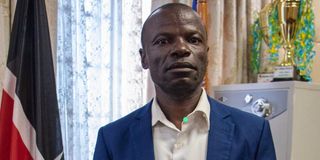Nakuru man's bid stopping leaders from branding public projects gets Senate's nod

A half burnt signage at the main shabab stage in Nakuru city with governor Susan Kihika's branding. Photo taken on June 25,2025.
Recently, someone on the streets of social media posed a question that sparked quite a conversation- does Governor Susan Kihika have to put her face on the Nakuru Agricultural Show posters?
While she may not have invented this now-common political branding tactic, her enthusiasm for it and that of her other political counterparts is unmatched.
One may argue that the politicians overcompensate for underwhelming performances with oversized portraits and names on nearly every public banner, billboard, and roadside event.
Psychologists suggest that such self-promotional behavior aligns with narcissistic traits specifically, a heightened need for admiration and an inflated sense of self-importance.
Leaders exhibiting these tendencies often rely on image over substance, using visibility as a stand-in for real impact.
But lo and behold, this branding bonanza may be headed for a shutdown.
In a move welcomed by #WeThePeople, senators have barred Governors and Members of County Assemblies (MCAs) from stamping their names or faces on public projects and government vehicles following a petition by Laban Omusundi, a Nakuru based good governance expert and the executive director of the Grassroot Civilian Oversight initiative.
This decision seeks to restore public service to its rightful place and argues that branding public projects and vehicles with individual names or images translates to the personalization of public resources, creating the impression of ownership.
In an interview with Mtaa Wangu, Omusundi says the progress made so far is not a win for him but for the taxpayers as it will translate to prudent use of public resources.

A photo of Nakuru-based human rights activist Laban Omusundi.
“It is incorrect for taxpayers’ money to be used for personal branding. After 30 days I believe that the resolution of the senate will be implemented and all personal branding will be removed immediately,” he says.
He notes that going forward information that should remain on public projects must be relevant for the consumption of the public.
“If the implementation does not happen after the expected duration, I will make a follow-up petition to the institutions mandated to fast-track the process. If they also don’t, I’ll move the petition to the high court,” Omusundi says sternly during the phone interview.
The petition was filed in August 2024, and while the expected timeline was 60 days, the resolution was passed by the Senate in June 2025.


